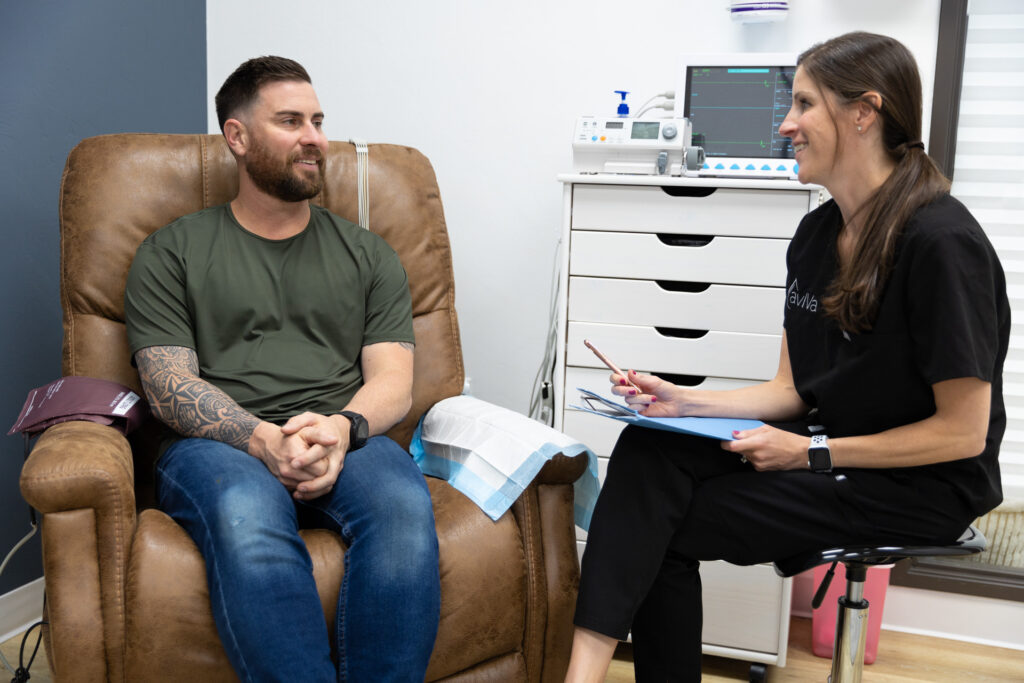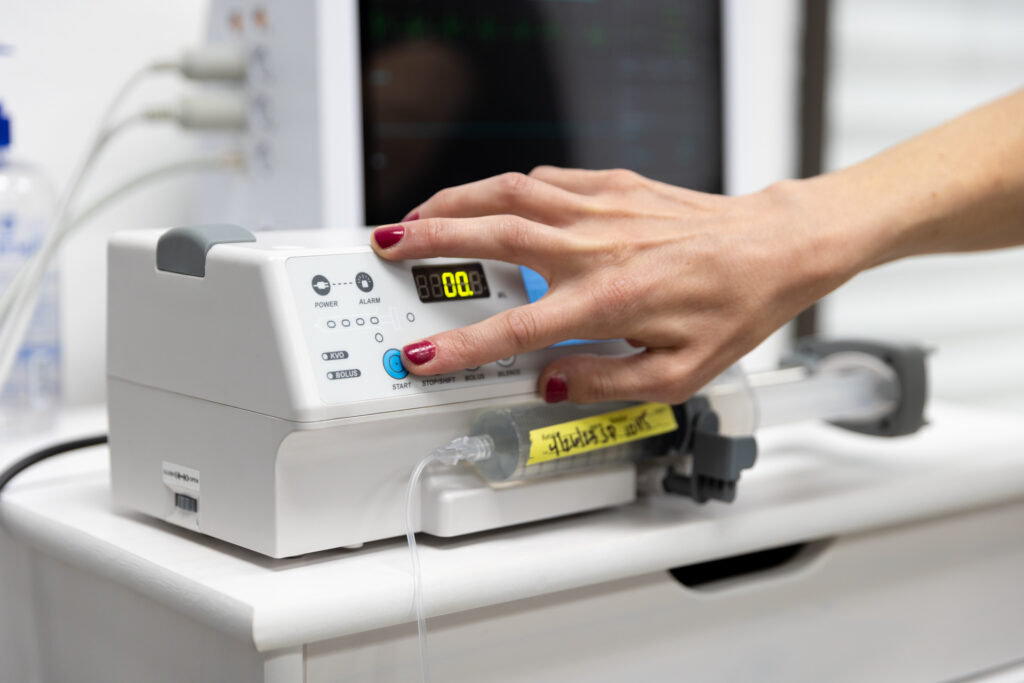Kick start your mental health at avIVa Infusions
Ketamine for OCD Treatment
What doctors are calling a promising novel therapy for OCD and anxiety.
At avIVa Infusions, we are proud to offer the latest in mental health treatment options.
In addition to high levels of safety standards and patient care, avIVa Infusions utilizes ketamine infusion therapy for the treatment of OCD, as well as other mood disorders like depression, PTSD, and anxiety.
Our mission statement at avIVa Infusions is to provide personalized, high-quality management options for people struggling with treatment-resistant conditions. Ketamine infusions have proven to be a powerful and rapid treatment for OCD and other mental health conditions.
Treatment Details
Consultation Required?
Yes
Downtime:
None
Sessions Needed:
Varies
Results Duration:
Varies
What it Treats
Obsessions & compulsions associated with OCD
Suicidal ideation / suicidal thoughts
Insomnia
Lack of appetite
Trouble focusing
Feelings of emptiness, sadness, and hopelessness
Intrusive thoughts
Ketamine therapy for OCD treatment in Green Bay
Effective Against Depression
Ketamine for OCD treatment offers fast and efficient relief from the symptoms of anxiety disorders or mental health conditions, with up to 75% of patients reporting a positive response to just a single ketamine infusion.
Fast Relief
With traditional treatments for anxiety disorders like OCD, it can sometimes take weeks or months before you experience symptom relief. Ketamine is an exciting new treatment option because in some cases it can provide relief from anxiety symptoms within days or even hours.
Minimal Side Effects
Compared to traditional methods of treating OCD, ketamine infusions come with minimal side effects, if any. Your avIVa provider will review all potential physical and/or mental effects of ketamine infusions to ensure you are fully educated before treatment begins.

Lifestyle Changes & Ketamine Therapy
The Path to Healing from Depression
There are certain lifestyle changes that can be made that are very useful when combined with a treatment like ketamine infusion.
Be Honest With Providers
At avIVa Infusions, you will have a free consultation with an experienced physician who will tailor a treatment plan to meet your needs. Once you are cleared for ketamine therapy to treat your OCD, we will schedule your treatments and let you know everything about how to prepare and what to expect during and after.
Stay Consistent
An essential part of the healing process is to develop a healthcare plan and stick to it. Do not skip ketamine infusions, psychotherapy sessions, or neglect to take your prescribed medications. These treatments may take months at a time, and they may not alleviate all of your symptoms, but recovery takes time. Have patience and trust your healthcare providers.
Educate Yourself
To learn is to understand, and to understand it to heal. Learn as much as you can about your disorder so that you pick up new ways to combat it. Your family and friends can also become educated on the nature of your symptoms so that they too can help understand and help you towards feeling better.
Keep a Journal
You should also work with your therapist and/or healthcare provider to learn what triggers your symptoms. It may help to keep a journal so that you can discover patterns in OCD episodes. This way, with the help of your therapist and/or healthcare provider, you can formulate a plan on what to do next time one of your symptoms begins to show.
Take Care of Yourself
It’s important to keep in mind that while alcohol and/or drugs may help reduce the pain of OCD symptoms temporarily, they will only create more problems and worsen your symptoms in the long run. It also carries the risk of making your illness harder to treat.
Eat Well
Beyond this, try to make sure you’re eating healthy whenever possible, as well as making physical activity a priority. It can come in the form of walking, jogging, swimming, working in the garden, or cycling. Also, try your best to keep a consistent sleep schedule. These activities combined can help you feel some relief from your symptoms.
Frequently Asked Questions
- What is OCD?
-
OCD (obsessive-compulsive disorder) is a mental health condition characterized by intrusive thoughts (known as obsessions) that lead you to perform ritualistic behaviors (known as compulsions). Occasional obsessive thoughts or compulsions are experienced by most people, but more than 2 million adults in the United States suffer from OCD.
While OCD can make you feel hopeless or isolated, the symptoms can be managed with medication. Therapy may also provide healthy coping mechanisms or new ways of thinking that bring relief.
- What are the symptom subtypes of OCD?
-
- Contamination Obsession with Washing and Cleaning Compulsion. Identified by obsessive notions about contamination and compulsions of extreme cleaning or washing.
- Harm Obsessions with Checking Compulsions. Identified by obsessive thoughts about potential damage to yourself or others, and compulsions including checking rituals to relieve your anxiety.
- Symmetry Obsessions with Ordering/Arranging/Counting Compulsions. Characterized through obsessive thoughts about symmetry and compulsions to make every little thing orderly until they are “just right”.
- Obsessions Without Visible Compulsions. Identified by intrusive thoughts about religious, intimate, or aggressive themes. Triggers related to these themes are typically steered clear of as much as possible.
- Hoarding. Characterized through obsessive anxieties of getting rid of items or belongings that you may need one day.
- What are the symptoms of OCD obsessions?
-
Obsessions are persistent and unwanted thoughts, feelings, or images that cause distress or anxiety. Those with OCD may try to ignore them by performing a compulsive behavior. Obsessions typically intrude when you’re going about your daily life, often getting in the way of your personal goals.
Examples of obsessions include:
- Fear of contamination
- Needing things orderly and symmetrical
- Aggressive or horrific thoughts about harming yourself or others
- Unwanted thoughts, including sexual or religious subjects
Signs and symptoms of obsession can include:
- Fear of contamination when touching objects others have touched
- Intense stress when objects aren’t orderly
- Images or intrusive thoughts of hurting yourself or someone else
- Thoughts of shouting obscenities or acting inappropriately
- Avoidance of situations that can trigger obsessions
- Distress about unpleasant sexual images repeating in your mind
- What are the symptoms for OCD compulsions?
-
Compulsions are repetitive behaviors that you feel as though you have to perform. Usually, these compulsions are in an effort to reduce anxiety from obsessive or intrusive thoughts. However, these compulsions often provide only temporary relief from anxiety.
Someone with OCD may make up rules or rituals they follow to help control this anxiety when having obsessive thoughts. These compulsions are usually excessive and not realistically related to the problem they’re intended to fix.
Much like obsessions, compulsions typically have themes as well, including:
- Washing and cleaning
- Checking
- Counting
- Orderliness
- Following strict routines
- Demanding reassurances
Examples of compulsion signs and symptoms include:
- Hand-washing until skin becomes raw
- Checking doors repeatedly to make sure they’re locked
- Checking the stove repeatedly to make sure it’s off
- Counting in certain patterns
- Silently repeating a prayer, word, or phrase
- Arranging your canned goods to face the same way
- What are the causes of OCD?
-
The exact cause of OCD is still not fully understood by science, but it is thought that the following factors play a part:
- Biology. OCD may simply be a result of changes in your body or brain’s chemistry.
- Genetics. While OCD may have a genetic component, specific genes have yet to be identified.
- Environment. Factors such as infections or medical conditions have been suggested as a trigger for OCD.Some factors that may increase the risk of triggering OCD may include:
- Family history. Family members with the disorder can increase your risk of developing OCD.
- Stressful life events. This reaction may sometimes trigger the intrusive thoughts, rituals, and emotional distress associated with OCD.
- Other mental health disorders, such as anxiety, depression, or substance abuse disorders.
- Can you prevent OCD?
-
There is no surefire way to prevent OCD. Getting treatment as soon as possible can help prevent OCD from worsening and negatively affecting your life. Some people with previously treatment-resistant OCD have experienced great success with the arrival of ketamine infusions, an innovative new treatment option.
Get Started
Tell us more about you and your needs using our Virtual Consultation Tool.
Input your concerns, and we’ll provide custom treatment recommendations for your unique needs.


